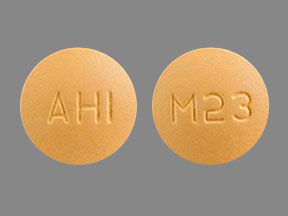
Methyldopa Coupons & Savings Card – Discount Prices from $14.49
Methyldopa is a medication used to manage high blood pressure (hypertension), either on its own or in combination with other drugs. By lowering blood pressure, it helps in preventing serious health issues such as strokes, heart attacks, and kidney problems. This medication belongs to the alpha-2 adrenergic receptor agonists class and works by signaling the brain to relax blood vessels, facilitating easier blood flow. Methyldopa is particularly favored for managing high blood pressure during pregnancy. Due to its short duration in the body, it needs to be taken multiple times a day. Some common side effects may include drowsiness, headaches, and a feeling of weakness. Always consult with a healthcare professional before starting or changing any medication.
Our coupons are free to use. Before paying, show the pharmacist your Methyldopa savings card to get your free discount. Use our filters below to edit the prescription box to match your needs. The Methyldopa prices will update based on your prescription needs. Above our Methyldopa coupons, you can change your location to see pharmacy prices and costs in other areas. We're here to help you buy Methyldopa at the lowest price with our prescription discount card.
My prescription
Edit
500MG, Methyldopa (60 Tablets)
Select pharmacy

CVS
$64.72
COUPON PRICE
Walmart
$14.49
COUPON PRICE
Albertsons
$40.78
COUPON PRICE
Walgreens
$47.03
COUPON PRICEMethyldopa savings card
Show this card to your pharmacist
Walmart
$14.49
BIN
ID
PCN
GRP
019876
LH433A91FC
CHIPPO
LHX
Powered by
Methyldopa is a medication used to manage high blood pressure (hypertension), either on its own or in combination with other drugs. By lowering blood pressure, it helps in preventing serious health issues such as strokes, heart attacks, and kidney problems. This medication belongs to the alpha-2 adrenergic receptor agonists class and works by signaling the brain to relax blood vessels, facilitating easier blood flow. Methyldopa is particularly favored for managing high blood pressure during pregnancy. Due to its short duration in the body, it needs to be taken multiple times a day. Some common side effects may include drowsiness, headaches, and a feeling of weakness. Always consult with a healthcare professional before starting or changing any medication.
Our coupons are free to use. Before paying, show the pharmacist your Methyldopa savings card to get your free discount. Use our filters below to edit the prescription box to match your needs. The Methyldopa prices will update based on your prescription needs. Above our Methyldopa coupons, you can change your location to see pharmacy prices and costs in other areas. We're here to help you buy Methyldopa at the lowest price with our prescription discount card.
Related central alpha agonists prescriptions
coupons from$8.45Save 91%
coupons from$13.00Save 61%
coupons from$6.58Save 87%
coupons from$21.44Save 66%
coupons from$454.33Save 66%
Related central alpha agonists prescriptions
Intuniv Save 91%coupons from $8.45
Guanfacine Save 61%coupons from $13.00
Zanaflex Save 87%coupons from $6.58
Kapvay Save 66%coupons from $21.44
Lucemyra Save 66%coupons from $454.33
Methyldopa dosage forms
Use our Methyldopa 250MG coupon with prices from $162.97 for 30 Tablets. You can also use our Methyldopa 250MG coupon with prices from $307.64 for 60 Tablets. We have a Methyldopa 250MG coupon with prices from $460.32 for 90 Tablets. You can use our Methyldopa 250MG coupon with prices from $508.54 for 100 Tablets.
Dosage Quantity Price from Per unit 250MG 30 Tablets $162.97 $5.43 250MG 60 Tablets $307.64 $5.13 250MG 90 Tablets $460.32 $5.12 250MG 100 Tablets $508.54 $5.08 250MG 180 Tablets $894.33 $4.97 250MG 270 Tablets $1328.35 $4.92 250MG 500 Tablets $2437.50 $4.88 500MG 60 Tablets $14.49 $0.24 500MG 90 Tablets $31.22 $0.35 500MG 100 Tablets $36.80 $0.37
| Dosage | Quantity | Price from | Per unit |
|---|---|---|---|
| 250MG | 30 Tablets | $162.97 | $5.43 |
| 250MG | 60 Tablets | $307.64 | $5.13 |
| 250MG | 90 Tablets | $460.32 | $5.12 |
| 250MG | 100 Tablets | $508.54 | $5.08 |
| 250MG | 180 Tablets | $894.33 | $4.97 |
| 250MG | 270 Tablets | $1328.35 | $4.92 |
| 250MG | 500 Tablets | $2437.50 | $4.88 |
| 500MG | 60 Tablets | $14.49 | $0.24 |
| 500MG | 90 Tablets | $31.22 | $0.35 |
| 500MG | 100 Tablets | $36.80 | $0.37 |
| 500MG | 180 Tablets | $81.44 | $0.45 |
| 500MG | 270 Tablets | $131.65 | $0.49 |
| 500MG | 500 Tablets | $259.97 | $0.52 |
